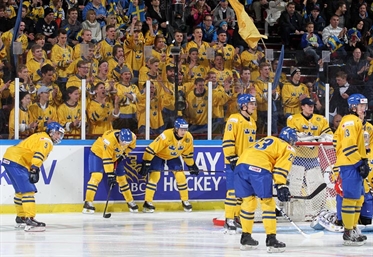Home ice advantage?
Home ice advantage?
Medalling common, gold not for World Juniors hosts

 Only six out of 37 host nations won the IIHF World Junior Championship on home ice. Fans in Malmö hope Sweden will win World Junior gold on home ice for the first time. Photo: Andre Ringuette / HHOF-IIHF Images
Only six out of 37 host nations won the IIHF World Junior Championship on home ice. Fans in Malmö hope Sweden will win World Junior gold on home ice for the first time. Photo: Andre Ringuette / HHOF-IIHF Images
From a historical standpoint, Swedish fans may not be happy to know that only six out of the past 37 World Junior champions have been host nations. These include Canada (1991, 1995, 2006, 2009), Finland (1998), and the Soviet Union (1983).
If you feel that winning any medal is a success, then the picture gets a little brighter.
Host nations have won silver eight times. The list includes Canada (1986, 1999, 2003, 2010), Czechoslovakia (1987), Finland (1980), the Soviet Union (1988), and Sweden (1993).
Bronze has gone to the hosts on seven occasions. It also appears to be the “hottest trend” among medal-winners, as each of the last three tournaments has seen the hosts come third. That list includes Canada (1978, 2012), Czechoslovakia (1977), Finland (2004), Russia (2013), Sweden (1979) and the United States (2011).
When gauging Canada’s excellent record as a host, it should also be acknowledged that Canada has hosted the tournament more times than anyone else (10). No one else has had it more than five times.
Conversely, which nations have performed the worst on home ice? Again, that depends on your definition of doing badly.
Overall, the United States has probably had the most disappointing record. It’s only won one medal (2011’s bronze) in five tries at home.
The record for the lowest finish by a host nation is seventh place, and that dubious distinction is shared by four different countries.
It wasn’t a huge shock for underdogs like Germany (1992) or Switzerland (1997). However, it’s a toss-up between Russia (2001) and the Czech Republic (2002) as to which seventh-place finish constitutes the biggest flop.
In 2001, the Russians were coming off a run of seven consecutive medals, and boasted such prominent future pros as Ilya Kovalchuk, Anton Volchenkov and Denis Grebeshkov.
In 2002, the Czechs were attempting to win a third straight gold medal with the likes of Jiri Hudler, Tomas Plekanec and Ales Hemsky.
At this tournament, Sweden will have to hope that its U20 squad can pick up some of the good vibes from what its senior team did at the 2013 IIHF Ice Hockey World Championship final in Stockholm. Sweden’s 5-1 win over Switzerland there ended the infamous “home ice curse” of the Worlds. No host nation had won that tournament since the Soviet Union in 1986.
Back to Overview































































